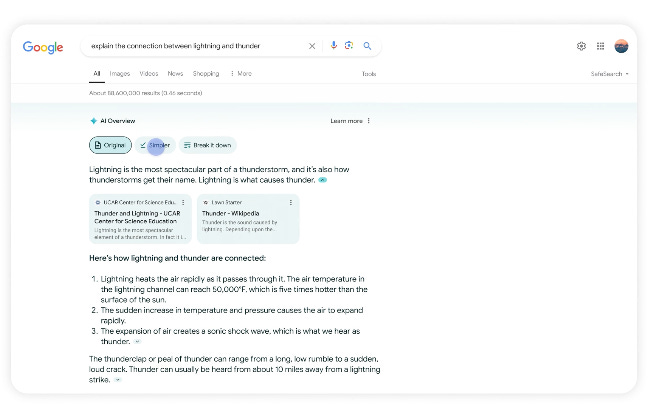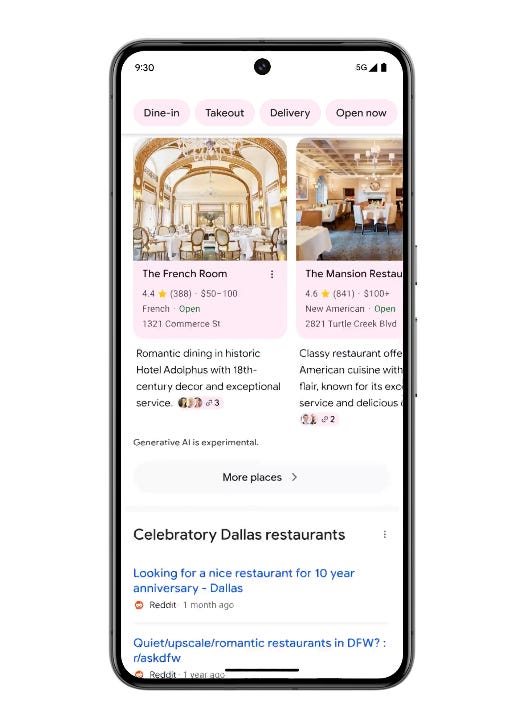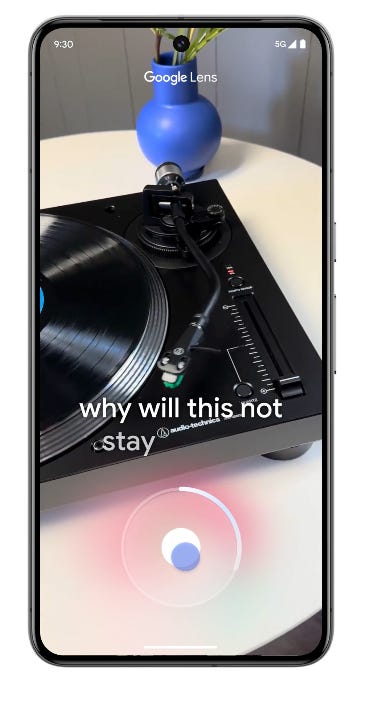My Thoughts on Google I/O and OpenAI's Spring Updates
Wild week, huh?
The amount of backlash and fear I’ve seen on LinkedIn and Twitter since I/O is a little surprising to me. Lots of people claim to know what’s going on, that they have the “3 things” that will help you navigate all the changes.
Spoiler: they don’t. And neither do I.
We’re all trying to figure this out as we go, parsing out how it impacts our jobs and our businesses.
This post is a bit impromptu, so it may be a little messy, but I wanted to get these thoughts out sooner rather than later.
AI Overviews In Search
Let’s start with the big one—the rollout of AI overviews more broadly in Google Search.

A lot of people are freaking out about this, but this isn’t new. SGE results have been shown on TONS of queries for the last few months. Google claims it improves CTR, but I have a hard time believing that.
If I get the answer I’m looking for, how likely am I to click into the next result?
The biggest issue here is that Google says they’re not going to break out AI Overview clicks and impressions from the rest of organic. Without that, we’ll have no real way to know what the impact is.
My hope is that they at least provide the information in the API data as a SERP feature or something, but time will tell how that shakes out.
Why This Isn’t a Bad Thing
Here’s my really hot take—AI Overviews are a good thing for everyone.
The amount of useless, mediocre, SEO-optimized content on the internet is astounding. Search for literally anything, and at least a few of the top 10 results are going to be exclusively designed to capture search traffic with no other purpose.
As marketers, we talk a lot about the value of creating content, how it brings users further down the funnel, all that stuff—but we’re living on a different planet from normal people.
No normal person, when they search or “coffee cake recipe” wants to read a 2,000-word manifesto on why this coffee cake was your grandma’s favorite—they just want a recipe.
This economy of content that’s been spun up by Google’s prevalence as a way of accessing information is not good for anyone. No one likes creating that terrible content, and no one likes reading it either.
We do it out of necessity—not because it’s an enjoyable experience.

Companies like Arc and now Google are continuing to talk about a “browser that browses for you.”
Even though this may affect some content publishers’ income stream, and that’s a real outcome to think about, I think most people could prefer that to what we have now, at least for simple question queries.
Maybe no one will ever have write another article on “how to water a plant.” That seems like a good future to me.
People Still Want To Search
That said, I don’t think AI removes peoples’ desire to search for and find their own solutions.
If I’m looking for a restaurant to take my wife to for an anniversary, am I going to let an AI make that choice for me?
No, of course not. It may help me narrow my choices in a big city, but I still want to look at the menus myself, talk with my wife, and ultimately make that decision.
AI may be better at creating an experience for me to browse through than traditional Google search, and it may answer simple questions, but search is such an ingrained part of what we do—I have a hard time seeing it completely disappearing.
Or, at least, disappearing because AI is integrated in Google Search now. There are some other reasons, but they have little to do with traditional search.
OpenAI & GPT-4o
Although most marketers are talking about Google I/O, I’m still trying to process everything from OpenAI’s Spring Update.
GPT-4o is an impressive model. The speed of response, the ability to have a voice conversation in real-time—it feels like real magic, even as we’ve gotten so used to AI.
If you haven’t seen the clips online yet, the short video on their landing page can give you a quick glimpse at what’s happening.
Google also showed off some similar features with Google Lens—using a multi-modal LLM to answer a question about a record player arm not staying in place.

As I sit and contemplate the future of digital marketing (and have a bit of an existential crisis along the way) these are the moments that stood out to me.
The One Prediction I Might Make
I know I said I can’t tell the future—and I cant—but there’s one prediction I’d like to share, with full knowledge I could be completely wrong.
I don’t think marketers need to be worried about AI Overviews or chat-based LLMs drastically changing the way we search. They haven’t had a massive impact yet, and I don’t see that changing anytime soon.
Instead, I think we’ll see a much bigger impact from these new AI features and surfaces that people haven’t even thought of before.
I think about a website like StackOverflow. Most of their traffic comes from people trying to diagnose coding problems and find solutions.
If I have a ChatGPT desktop app that can see my screen as I code and have a live conversation with me about ways to improve and debug it, I don’t even need to search anymore.
Search doesn’t disappear—but top-of-funnel, informational, problem-solving search probably does.
AI is an infinitely better way of solving for those small, one-off problems. Anything that could be answered with a featured snippet is probably better answered with AI, and best answered visually or in a conversation.
And before that, Apple is likely to make a deal with OpenAI and integrate a lot of these real-time AI assistant features directly into Siri.
The thing keeping people on Google Search right now is habit and ease of UX. If Apple can find a way to integrate the kind of experience we’re seeing in the GPT app directly into iOS, I think we’ll see a pretty significant decline in informational searches—and fast.
What I’m Doing About It
So all of this said—what do you do?
No one can see the future, and there’s still a lot of question marks in our minds around how this shakes out. For now, I'm not sure I’ll change much of anything. It feels too soon.
For all we know, this could be the peak of AI technology and it never gets any better. Or, in a couple of years, we could be going to Westworld for vacation.
Either way, the important thing is keep your eyes open, pay attention to what’s happening, and adapt accordingly.
Marketing is about connecting the right products with the right people who would have an interest in buying them. The ways we do that might change, but there will always be a need to organically reach people.
And remember—lots of people still aren’t even using ChatGPT yet. It’ll take a while before this all reaches a level of influence and impact that drastically changes things.

